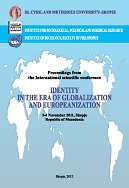Author(s): Irena Veljanova / Language(s): English
Issue: 1/2012
Over two decades ago, G. Carter Bentley recognised the fact that up until that time, not one of
the discussions on ethno-identity had explained ‘how people come to recognise their commonalities
in the first place’; that is, how ‘symbolic construal of sensations of likeness and difference’ (Bentley, 1987: 27) may be accounted for. Building on Bourdieu’s Theory of Practice (formulated in Bourdieu’s Outline of a Theory of Practice (1977)), Bentley developed an approach which came to be known as the Practice Theory of Ethnicity. The proponents of this approach (Bentley 1987, 1991; Eriksen 1991, 1992, 1993; Dunn, 2005, 2009) have performance (practice) at the core of the construction of collective ethno-identities in common.
A recent study by Veljanova (2010), which investigated how the emic quality of Macedonianness
developed in Australia, indicated the strong relevance of the practice (performance) theory of ethnicity. As Veljanova suggests, ‘practice is considered at the core of Macedonianness in Australia; in other words, it is an enacted Macedonianness’ (2010: 78).
It may be argued that a long-standing challenge to the distinctness of anything imagined as ethno-
Macedonian, that is, the substance of enacted and imagined Macedonian-ness, when internalised,
poses a threat to a people’s collective existence; as a result, tacit and strategic ‘defensive’ mechanisms are developed and redeveloped. Drawing on the results of Veljanova’s study (Veljanova, 2006-2010), this paper focuses upon (1) whether the survey respondents (N=764 valid survey responses) believed (or did not believe) in functional informal sanctioning mechanisms; and, (2) the informal sanctioning mechanisms that operate within the Macedonian ethno-community in Australia in the ‘service’ of ethno-cultural continuity. Apropos of the former (1), the study indicated that out of 764 valid survey responses, 36.1% of interviewees believe in their existence, 30.8% do not believe in their existence, and 32.7% are undecided. As regards the latter (2), drawing on the findings of the study, and with particular focus on Macedonian cuisine as an embodied Macedonian-ness, the following informal sanctioning mechanisms will be discussed: gossip, ostracism, loss of respect, unwelcomeness and loss of support.
More...

